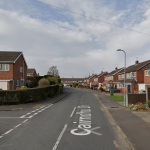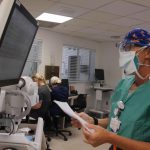There have now been 11 confirmed cases of the new Omicron coronavirus variant in the UK, with contact tracing efforts ramping up in Essex, Nottingham, London and Scotland.
Scientists in southern Africa alerted the rest of the world to the COVID variant on 23 November – and the first two cases confirmed on British soil came on 27 November in Brentwood and Nottingham.
Follow live COVID updates from across the UK and around the world
But after further analysis, people who visited a KFC restaurant in Brentwood as far back as 19 November and the town’s Trinity Church on 21 November are being told to get tested – as they could have been exposed to Omicron.
An Omicron case was also identified in Westminster, central London. The infected person has since left the country. Also two other cases have been detected elsewhere in the capital – in Camden, north London, and Wandsworth, south London, taking the total in England to five.
In Scotland, First Minister Nicola Sturgeon has also revealed that “not all” of the six Scottish cases have recent travel history or links to southern Africa.
This could mean Omicron was already circulating in the UK before it was officially confirmed in Africa.
COVID-19: Scottish and Welsh governments demand Boris Johnson toughens travel rules further in response to Omicron variant
COVID-19: New study calls for hospitalised patients to receive quicker brain scans
COVID-19: Ministers want to keep new restrictions within the window of what Tory MPs can accept
Here Sky News looks at how the UK is able to test for the new variant and whether it has the capacity to contain it quickly enough.
How can experts tell if a case is Omicron or not?
There are two ways scientists can tell if a positive coronavirus case is the new Omicron variant or not.
Both require PCR tests – as the lateral flow ones you can do at home are not analysed in a laboratory.
Either the test samples can be sent for standard genomic sequencing, which is how the Delta variant has been monitored and takes between five to seven days.
Or a molecular tool called S gene target failure (SGTF) can be used to immediately identify a suspected Omicron case.
SGTF refers to the S gene – an element of the virus not present in the Omicron variant.
So if the S gene is not present in a PCR sample – the case is highly likely to be Omicron.
This has to be confirmed by full genomic sequencing, but it means cases can be isolated immediately – instead of having to wait as long as a week.
“The way we normally check for variants is by detecting three parts of the virus,” Dr Al Edwards, associate professor in biomedical technology at the University of Reading, has told Sky News.
“It’s a helpful coincidence, as was the case with Alpha, that one of those targets disappears for this new variant.
“It needs to be followed up and confirmed, but it becomes a very, very useful tool.”
What is the UK’s variant testing capacity?
Genomic sequencing is the analysis done in labs that identifies COVID-19‘s genetic make-up and therefore which variant of the virus a particular test sample is.
Not all tests are sequenced, but the UK has one of the best systems in the world, with more tests analysed for variants here than most other countries.
But as genomic sequencing can take up to a week, this could cause problems in the race to stop Omicron spreading.
Those who come into contact with someone who tests positive for the Omicron variant will need to self-isolate for 10 days – even if they are fully vaccinated.
So the delay in identifying Omicron cases by sequencing could mean their contacts potentially spreading the virus to other people for a week until it can be confirmed.
Please use Chrome browser for a more accessible video player
“There’s a disconnect in contact tracing if by the time you sequence, it’s already too late to isolate,” Dr Edwards says.
This means SGTF will be key in quickly identifying people with the new variant and stopping them spreading it to other people.
The UK Health and Security Agency (UKHSA) has confirmed 50% of its community testing labs can “assess samples for SGTF”.
It says all close contacts of suspected Omicron cases will “have samples priority tested for S gene target failure and will also have whole genome sequencing”.
Anyone who attends surge testing sites in at-risk areas – such as Brentwood – will also get priority.
And all labs that process tests for NHS hospital patients, visitors and staff “can conduct a rapid genotyping test” to reveal “whether a potential variant has been detected in hospital settings before whole genome sequencing”, the UKHSA added.
Please use Chrome browser for a more accessible video player
Is reduced S gene testing a problem?
Although not all labs will be able to do the quicker SGTF analysis, the UK is still ahead of most other countries in its sequencing abilities.
“The positive thing is that we are extremely experienced and equipped to deal with this,” Dr Edwards says.
“The genomic sequencing capacity is there, we’re just scaling it up. Everything will be done as quickly as is physically possible, so I’m not too worried.
“The big thing to establish with Omicron is how well it transmits in vaccinated populations and we don’t know that yet.”
What about travel?
PCR tests for international travel are provided by private companies – not the NHS.
This means there is no guarantee travel tests have SGTF capacity.
The government says it is “engaging all of the labs that provide private travel testing services” to “understand how many will be able to carry out the S gene target failure” or “equivalent assay focused on Omicron’s genomic changes”.
Please use Chrome browser for a more accessible video player
Anyone who has travelled from the southern African countries on the UK red list will get priority SGTF and full sequencing – as they will be “treated as suspected cases”.
But the gap between private travel tests providers and the government’s COVID surveillance could cause serious problems in trying to prevent new cases from elsewhere.
“The point of travel testing is to detect those positive variant cases – that’s the front line,” Dr Edwards says.
“But if travel testing is weaker than what the government is doing then that really is a real weakness in the system.”
However in Scotland, some of the cases confirmed so far do not appear to be connected to travel, which suggests Omicron is already spreading within the UK.
Dr Edwards claims tightening contact tracing rules could be the answer if this is the case.
“The other way to help solve this is to treat every positive case as suspected Omicron – so they and all their contacts have to self-isolate,” he says. “No one wants to go back to that, but it would help.”






















